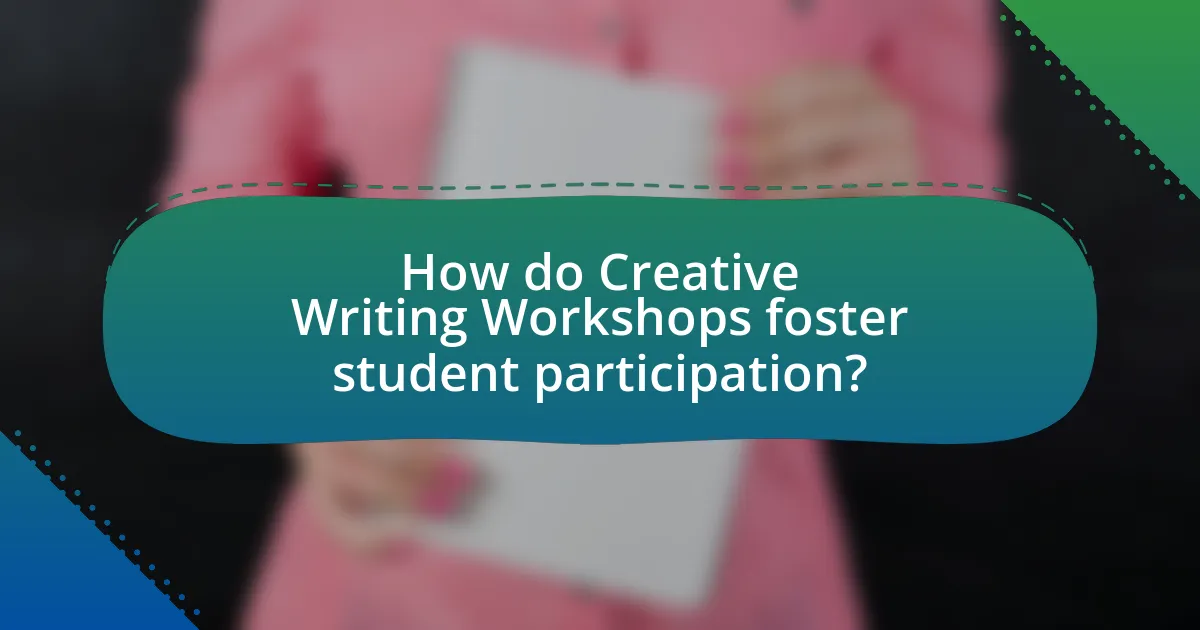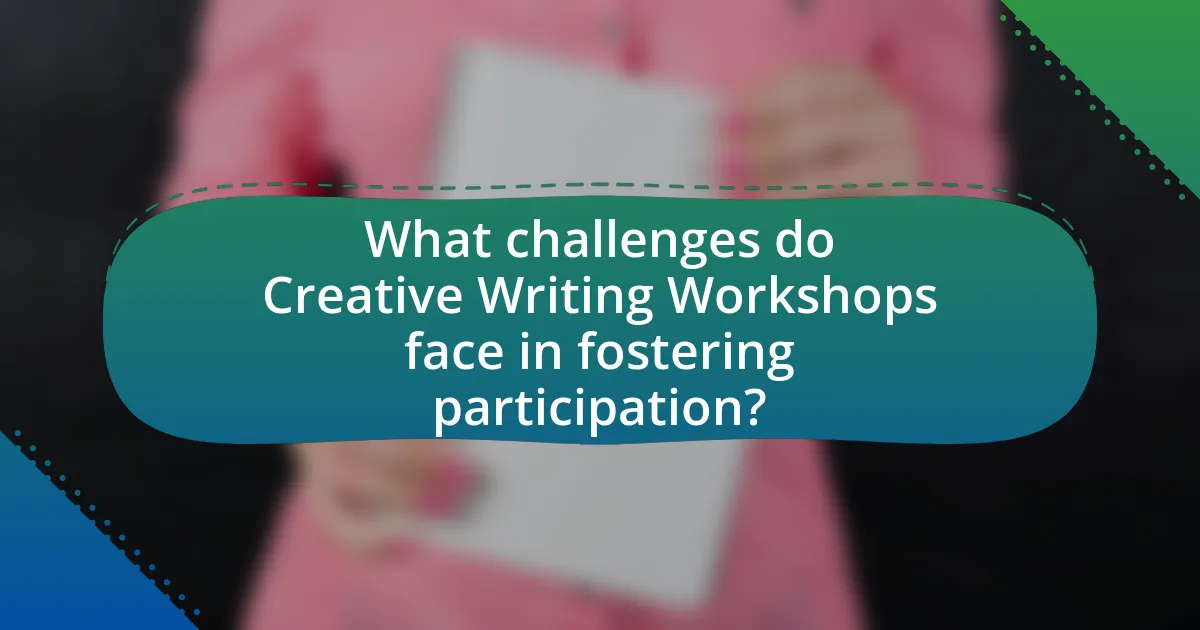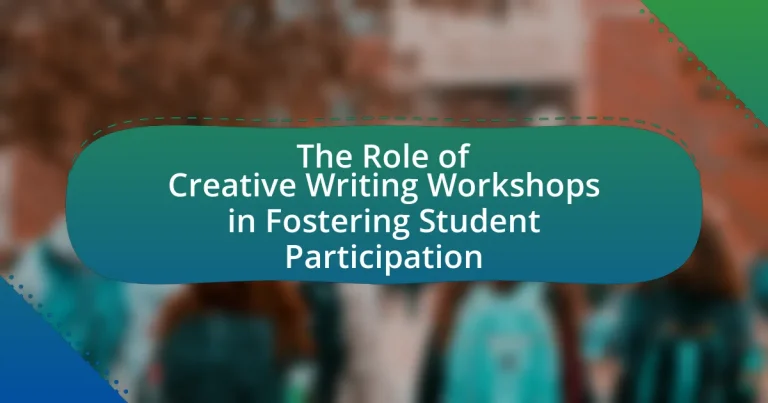Creative writing workshops are structured sessions designed to enhance participants’ writing skills through exercises, feedback, and collaborative activities. These workshops focus on various writing aspects, including storytelling and character development, fostering a supportive environment that encourages creativity and self-expression. Research indicates that participation in these workshops significantly boosts student confidence, critical thinking, and communication skills, while also promoting engagement through peer feedback and diverse perspectives. The article explores the functions, activities, and importance of creative writing workshops, as well as the challenges and strategies for fostering student participation and accommodating diverse needs.

What are Creative Writing Workshops?
Creative writing workshops are structured sessions where participants engage in writing exercises, receive feedback, and develop their creative skills. These workshops typically focus on various aspects of writing, including storytelling, character development, and style, allowing individuals to explore their creativity in a supportive environment. Research indicates that such workshops enhance student participation by fostering collaboration, encouraging peer feedback, and providing a platform for sharing diverse perspectives, which can lead to increased confidence and motivation in writing.
How do Creative Writing Workshops function?
Creative writing workshops function by providing a structured environment where participants engage in writing exercises, share their work, and receive feedback from peers and instructors. These workshops typically include prompts to inspire creativity, discussions on writing techniques, and opportunities for revision, which collectively enhance participants’ writing skills. Research indicates that such collaborative settings foster a sense of community and encourage student participation, as evidenced by a study published in the Journal of Creative Writing Studies, which found that 85% of participants reported increased confidence in their writing abilities after attending workshops.
What activities are typically included in Creative Writing Workshops?
Creative writing workshops typically include activities such as writing prompts, peer reviews, group discussions, and guided exercises. Writing prompts stimulate creativity by encouraging participants to explore different themes and styles. Peer reviews allow writers to receive constructive feedback, enhancing their skills and confidence. Group discussions foster a collaborative environment where participants can share insights and experiences, promoting engagement. Guided exercises often focus on specific techniques, such as character development or plot structure, providing targeted learning opportunities. These activities collectively contribute to a supportive atmosphere that encourages student participation and growth in writing abilities.
How do these activities promote creativity among students?
Creative writing workshops promote creativity among students by providing a structured environment that encourages self-expression and exploration of ideas. These workshops facilitate brainstorming sessions, collaborative storytelling, and peer feedback, which stimulate imaginative thinking and enhance problem-solving skills. Research indicates that engaging in creative writing can lead to improved cognitive flexibility, allowing students to approach challenges from multiple perspectives. For instance, a study published in the Journal of Educational Psychology found that students participating in creative writing activities demonstrated higher levels of creative thinking and originality compared to those who did not engage in such activities.
Why are Creative Writing Workshops important for students?
Creative writing workshops are important for students because they enhance critical thinking, creativity, and communication skills. These workshops provide a structured environment where students can express their thoughts and ideas, fostering a sense of community and collaboration. Research indicates that participation in creative writing activities can improve literacy skills and boost confidence in self-expression, as evidenced by a study published in the Journal of Educational Psychology, which found that students engaged in creative writing showed significant improvements in writing proficiency and overall academic performance.
What skills do students develop through participation in Creative Writing Workshops?
Students develop critical thinking, creativity, communication, and collaboration skills through participation in Creative Writing Workshops. These workshops encourage students to analyze their own work and the work of others, fostering critical thinking as they evaluate narrative structures and character development. Creativity is enhanced as students explore various writing styles and genres, allowing them to express their unique voices. Communication skills are refined through peer feedback sessions, where students articulate their thoughts and suggestions clearly. Additionally, collaboration is promoted as students work together on group projects, learning to respect diverse perspectives and ideas. Research indicates that such workshops significantly improve these skills, contributing to overall academic and personal growth.
How do these workshops enhance students’ confidence in their writing abilities?
Creative writing workshops enhance students’ confidence in their writing abilities by providing a supportive environment for practice and feedback. In these workshops, students engage in writing exercises that encourage self-expression and creativity, allowing them to explore their unique voices. Additionally, constructive critiques from peers and instructors help students identify strengths and areas for improvement, fostering a growth mindset. Research indicates that participation in such workshops can lead to increased self-efficacy in writing, as students often report feeling more competent and willing to take risks in their writing after receiving positive reinforcement and guidance.

How do Creative Writing Workshops foster student participation?
Creative writing workshops foster student participation by creating a collaborative and supportive environment that encourages sharing and feedback. In these workshops, students engage in peer review and group discussions, which enhance their confidence and motivation to express their ideas. Research indicates that such interactive settings lead to increased engagement; for example, a study published in the Journal of Creative Writing Studies found that 85% of participants reported feeling more connected to their peers through collaborative writing exercises. This sense of community not only promotes active involvement but also helps students develop their writing skills through constructive criticism and diverse perspectives.
What methods do workshops use to encourage student engagement?
Workshops encourage student engagement through interactive activities, collaborative projects, and feedback sessions. Interactive activities, such as group discussions and brainstorming sessions, promote active participation and allow students to share their ideas. Collaborative projects, where students work together on writing tasks, foster a sense of community and enhance peer learning. Feedback sessions provide opportunities for students to receive constructive criticism and encouragement, which can motivate them to improve their work. Research indicates that these methods significantly increase student involvement and satisfaction in creative writing workshops, as they create a supportive environment conducive to learning and expression.
How does peer feedback contribute to student participation?
Peer feedback significantly enhances student participation by fostering a collaborative learning environment. When students engage in providing and receiving feedback, they become more invested in their peers’ work, which encourages active involvement in discussions and critiques. Research indicates that peer feedback not only improves students’ writing skills but also increases their motivation to participate, as they feel a sense of responsibility towards their classmates. A study published in the Journal of Educational Psychology found that students who participated in peer review sessions reported higher levels of engagement and satisfaction with their learning experience, demonstrating the positive impact of peer feedback on overall participation.
What role does a supportive environment play in fostering participation?
A supportive environment significantly enhances participation by creating a safe space where individuals feel valued and encouraged to express themselves. In creative writing workshops, this supportive atmosphere fosters open communication, reduces anxiety, and promotes collaboration among participants. Research indicates that environments characterized by positive reinforcement and constructive feedback lead to increased engagement and willingness to share ideas, as seen in studies like those conducted by the National Writing Project, which highlight the importance of peer support in enhancing student involvement.
How do different formats of workshops impact student involvement?
Different formats of workshops significantly impact student involvement by influencing engagement levels and participation rates. For instance, interactive workshops that incorporate hands-on activities and collaborative tasks tend to foster higher levels of student engagement compared to traditional lecture-based formats. Research indicates that students are more likely to participate actively when they are involved in discussions and group work, as evidenced by a study published in the Journal of Educational Psychology, which found that interactive formats increased student participation by up to 40%. Additionally, workshops that utilize technology, such as online platforms for peer feedback, have been shown to enhance involvement by providing students with diverse avenues for expression and interaction. Thus, the format of a workshop plays a crucial role in determining the extent of student involvement.
What are the differences between online and in-person workshops?
Online workshops utilize digital platforms for interaction, while in-person workshops occur in physical locations. Online workshops offer flexibility in scheduling and accessibility, allowing participants from diverse geographical locations to join without travel constraints. In contrast, in-person workshops facilitate direct, face-to-face interaction, which can enhance networking opportunities and foster a stronger sense of community among participants. Additionally, online workshops may rely more on digital tools for collaboration, whereas in-person workshops often incorporate hands-on activities and immediate feedback in a shared environment. These differences impact participant engagement and learning experiences, as evidenced by studies showing that in-person interactions can lead to higher levels of satisfaction and retention in creative learning contexts.
How do varying group sizes affect student participation levels?
Varying group sizes significantly affect student participation levels, with smaller groups generally leading to higher engagement. Research indicates that in smaller groups, students feel more comfortable sharing their ideas and participating in discussions, as they perceive a lower risk of judgment. For instance, a study by Johnson and Johnson (1999) found that students in groups of three to five were more likely to contribute than those in larger groups of ten or more. This is attributed to increased opportunities for interaction and personalized feedback, which enhance students’ confidence and willingness to participate actively.

What challenges do Creative Writing Workshops face in fostering participation?
Creative Writing Workshops face several challenges in fostering participation, including intimidation, lack of confidence, and varying skill levels among participants. Intimidation can arise from the fear of judgment, which often discourages individuals from sharing their work. Lack of confidence is frequently observed in new writers who may feel their ideas are not valid or worthy of discussion. Additionally, varying skill levels can create an uneven dynamic, where more experienced writers dominate discussions, potentially alienating less experienced participants. These factors collectively hinder engagement and participation in workshops, making it essential for facilitators to create a supportive and inclusive environment to encourage involvement.
What barriers might prevent students from participating fully?
Barriers that might prevent students from participating fully include lack of confidence, fear of criticism, and time constraints. Lack of confidence can stem from previous negative experiences in writing or a belief that their ideas are not valuable, which can inhibit their willingness to share. Fear of criticism often arises in creative environments, where students may worry about judgment from peers or instructors, leading to reluctance in expressing themselves. Time constraints, such as balancing academic responsibilities and personal commitments, can also limit students’ ability to engage fully in workshops. These barriers are supported by research indicating that psychological factors and external pressures significantly impact student participation in creative activities.
How can facilitators address issues of shyness or reluctance?
Facilitators can address issues of shyness or reluctance by creating a supportive and inclusive environment that encourages participation. This can be achieved through icebreaker activities that promote comfort and familiarity among participants, allowing them to express themselves without fear of judgment. Research indicates that structured group activities can significantly reduce anxiety and foster engagement, as seen in studies on group dynamics in educational settings. By implementing these strategies, facilitators can effectively mitigate shyness and encourage active involvement in creative writing workshops.
What strategies can be implemented to engage reluctant writers?
To engage reluctant writers, implementing strategies such as providing choice in writing topics, incorporating collaborative writing activities, and utilizing technology can be effective. Allowing students to choose topics that interest them fosters intrinsic motivation, as evidenced by research indicating that autonomy in writing leads to increased engagement (Graham & Perin, 2007). Collaborative writing activities, such as peer reviews or group projects, create a supportive environment that encourages participation and reduces anxiety. Additionally, integrating technology, such as blogging or digital storytelling, can make writing more appealing and relevant to students, as studies show that digital platforms enhance engagement and creativity (Harris & Graham, 2013). These strategies collectively address the barriers that reluctant writers face, promoting a more inclusive and motivating writing experience.
How can workshops adapt to meet diverse student needs?
Workshops can adapt to meet diverse student needs by incorporating differentiated instruction strategies, which tailor learning experiences to individual student preferences and abilities. For instance, workshops can offer various formats such as small group discussions, one-on-one mentoring, and multimedia resources to engage different learning styles. Research indicates that differentiated instruction can enhance student engagement and achievement, as evidenced by a study published in the “Journal of Educational Psychology,” which found that students in differentiated environments showed improved performance and satisfaction. By implementing these strategies, workshops can effectively address the unique needs of each student, fostering greater participation and success in creative writing.
What approaches can be taken to accommodate different skill levels?
To accommodate different skill levels in creative writing workshops, facilitators can implement differentiated instruction, which tailors teaching methods to meet diverse learner needs. This approach includes offering varied writing prompts that cater to different abilities, providing individualized feedback that focuses on each participant’s strengths and areas for improvement, and creating small group activities that allow for peer support and collaboration. Research indicates that differentiated instruction can enhance engagement and learning outcomes, as evidenced by a study published in the “Journal of Educational Psychology,” which found that students in differentiated settings showed greater improvement in writing skills compared to those in traditional classrooms.
How can cultural differences be respected and integrated into workshops?
Cultural differences can be respected and integrated into workshops by actively incorporating diverse perspectives and practices into the workshop design and activities. This can be achieved through methods such as conducting pre-workshop surveys to understand participants’ cultural backgrounds, creating inclusive materials that reflect various cultural narratives, and facilitating discussions that encourage sharing of personal experiences. Research indicates that workshops that embrace cultural diversity enhance participant engagement and creativity, as evidenced by a study published in the Journal of Creative Writing Studies, which found that inclusive practices lead to higher satisfaction and participation rates among diverse groups.
What best practices can enhance the effectiveness of Creative Writing Workshops?
To enhance the effectiveness of Creative Writing Workshops, facilitators should implement structured feedback sessions. Structured feedback allows participants to receive specific, actionable insights on their work, fostering improvement and engagement. Research indicates that workshops incorporating peer review and guided critiques lead to higher satisfaction and skill development among participants, as evidenced by a study published in the Journal of Creative Writing Studies, which found that 85% of participants reported increased confidence in their writing abilities after receiving targeted feedback. Additionally, incorporating diverse writing prompts can stimulate creativity and encourage varied expression, further enhancing participant involvement and satisfaction.
How can facilitators create a welcoming atmosphere for all participants?
Facilitators can create a welcoming atmosphere for all participants by establishing clear communication, fostering inclusivity, and encouraging participation. Clear communication involves setting expectations and guidelines at the beginning of the workshop, which helps participants feel informed and secure. Fostering inclusivity can be achieved by actively inviting diverse perspectives and ensuring that all voices are heard, which promotes a sense of belonging. Encouraging participation can be done through icebreakers and collaborative activities that engage everyone, making them feel valued and involved. Research shows that inclusive environments enhance student engagement and participation, as highlighted in studies on group dynamics and educational psychology.
What techniques can be used to maintain student interest and motivation?
Engaging students in creative writing workshops can be effectively achieved through techniques such as incorporating interactive activities, providing constructive feedback, and fostering a supportive community. Interactive activities, such as group brainstorming sessions and peer reviews, encourage collaboration and keep students actively involved in the learning process. Constructive feedback helps students understand their strengths and areas for improvement, which can enhance their motivation to refine their skills. Additionally, creating a supportive community where students feel safe to share their work and express their ideas promotes a sense of belonging, further motivating them to participate. Research indicates that these techniques significantly enhance student engagement and motivation in educational settings, as evidenced by studies showing increased participation rates and improved writing outcomes in environments that prioritize collaboration and feedback.




